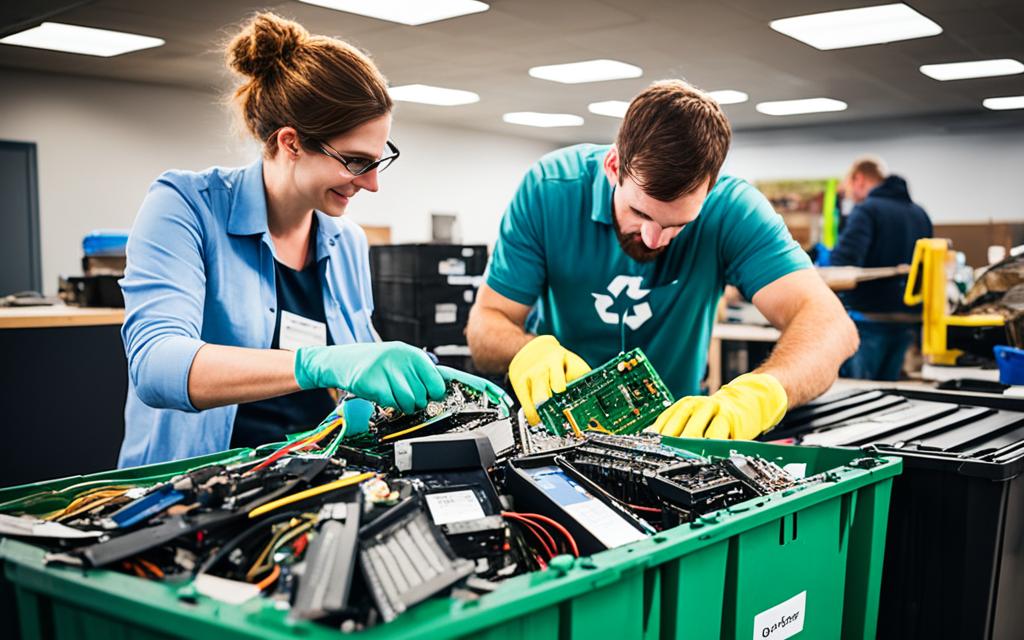Community Engagement in Desktop Recycling Programs
Welcome to our article on community engagement in desktop recycling programs. In today’s digital age, the need for sustainable waste management practices has never been more critical. As technology continues to advance, the disposal of electronic waste, known as e-waste, presents significant challenges to our environment and communities. That’s why recycling program development and community engagement are key to addressing this issue and promoting a more sustainable future.
The Significance of Community Engagement in Waste Management
Community engagement plays a vital role in waste management, creating a sense of ownership and responsibility towards sustainable waste practices. When community members actively participate in waste management initiatives, it promotes environmental awareness and encourages behavioral change towards sustainable waste practices.
Engaging the community in waste management has the potential to yield impressive results. By increasing community participation, recycling rates can be boosted, waste generation can be reduced, and overall environmental sustainability can be enhanced.
Encouraging the community to take an active role in waste management practices creates a culture of environmental responsibility. It fosters a shared understanding of the importance of waste reduction and recycling, leading to long-term behavioral changes that benefit the environment and the community as a whole.
“Community engagement in waste management is the key to building a sustainable future. By involving residents, we harness their knowledge, skills, and commitment to create a cleaner, greener environment for future generations.”
Implementing community engagement initiatives in waste management is an effective way to raise environmental awareness and promote sustainable practices. By working together, communities can make a significant impact on waste reduction and environmental sustainability.
Best Practices for Community Engagement in Waste Management
Implementing education and awareness programs is crucial for engaging communities in waste management. These programs provide valuable information about waste reduction, recycling guidelines, and the environmental impact of improper waste disposal. By educating the community, we empower individuals to make informed choices and take responsibility for their waste.
Community-based initiatives are another effective way to foster engagement and behavior change. Clean-up events, recycling drives, and composting workshops provide opportunities for active involvement, allowing individuals to see the tangible impact of their actions. These initiatives also encourage a sense of ownership and pride within the community, strengthening their commitment to sustainable waste practices.
Behavior change is a central focus of community engagement in waste management. By creating awareness and providing resources, we can inspire individuals to adopt sustainable habits and make conscious choices about waste disposal. Community involvement plays a vital role in reinforcing behavior change, as individuals are more likely to sustain new practices when surrounded by a supportive and engaged community.
“Community engagement is key to establishing a sustainable waste management culture. By empowering individuals and promoting behavior change, we can create lasting impact and build a more environmentally conscious society.”
Education and Awareness Programs
Education and awareness programs form the foundation of community engagement in waste management. These programs aim to inform and educate individuals about the environmental consequences of improper waste disposal and the benefits of sustainable practices.
Key elements of education and awareness programs include:
- Workshops and seminars on waste reduction strategies
- Guidelines for recycling different types of waste
- Information on the environmental impact of waste
- Training on proper waste sorting and disposal techniques
By providing the community with knowledge and understanding, education and awareness programs pave the way for behavior change.
Community-Based Initiatives
Community-based initiatives are instrumental in engaging individuals and fostering a sense of collective responsibility. These initiatives create opportunities for active involvement and hands-on experience with waste management practices.
Examples of community-based initiatives include:
- Clean-up events: Mobilize community members to clean up public spaces, promoting a sense of pride and cleanliness.
- Recycling drives: Establish collection points or events for specific recyclable items, encouraging participation and diverting waste from landfills.
- Composting workshops: Teach community members how to compost food waste, promoting organic waste reduction and soil enrichment.
These initiatives not only raise awareness but also provide a platform for individuals to actively contribute to waste management efforts.
| Benefits | Challenges |
|---|---|
| Promotes environmental sustainability | Collection and logistics |
| Encourages individuals to adopt sustainable habits | Data security |
| Strengthens community bonds and pride | Financial sustainability |
| Creates a culture of collective responsibility |
Successful Case Studies of Community Engagement in Waste Management
Community engagement is a key driver in waste management, with successful case studies illustrating the positive outcomes of involving communities in sustainable practices. These case studies showcase the implementation of innovative strategies, including zero-waste initiatives, community recycling centers, and waste reduction campaigns. These initiatives not only demonstrate the power of community engagement but also highlight the substantial improvements in waste management practices and the promotion of a sustainable culture.
Zero-Waste Initiatives
One remarkable case study is the community of Roseville, California. They successfully introduced a zero-waste initiative, which aimed to divert all materials from the landfill and maximize recycling efforts. Through community engagement and education, they encouraged residents to minimize waste generation, embrace recycling, and implement composting practices. As a result, Roseville achieved an impressive waste diversion rate of 80%, significantly reducing the environmental impact of waste disposal.
Community Recycling Centers
The town of Kirklees, United Kingdom, established community recycling centers to encourage active participation in waste management. These centers provided convenient and accessible locations for residents to recycle various materials, including paper, plastic, glass, and electronics. Equipped with user-friendly facilities and educational resources, these centers fostered a sense of responsibility and convenience, leading to increased recycling rates and reduced waste accumulation in landfills.
Waste Reduction Campaigns
A notable waste reduction campaign was implemented in Seattle, Washington, where the local government partnered with community organizations to raise awareness about the importance of waste reduction and effective recycling practices. Through targeted educational campaigns, public events, and partnerships with local businesses, Seattle successfully reduced waste generation and increased recycling rates. The campaign emphasized the community’s role in waste reduction, empowering residents to make sustainable choices and embracing a lifestyle that minimizes waste.
“Community recycling centers play a significant role in waste management by providing accessible and user-friendly facilities for residents to recycle various materials.”
These case studies exemplify the positive impact of community engagement in waste management. By involving communities in zero-waste initiatives, establishing community recycling centers, and running waste reduction campaigns, significant improvements can be achieved in waste management practices and the overall promotion of a sustainable culture.
| Case Study | Location | Initiative | Results |
|---|---|---|---|
| Roseville, California | Roseville, California, United States | Zero-Waste Initiative | 80% waste diversion rate, reducing environmental impact |
| Kirklees | Kirklees, United Kingdom | Community Recycling Centers | Increased recycling rates and reduced waste accumulation in landfills |
| Seattle, Washington | Seattle, Washington, United States | Waste Reduction Campaigns | Reduced waste generation and increased recycling rates |
These successful case studies highlight the power of community engagement in waste management and serve as inspiration for other communities. By implementing similar initiatives, communities can make significant strides towards waste reduction, improved recycling rates, and overall environmental sustainability.
The Role of Local Government and Organizations in Community Engagement
When it comes to community engagement in waste management, the role of local government and organizations is paramount. They have a crucial responsibility to provide the necessary infrastructure, resources, and support that enable communities to actively participate in sustainable waste practices. By collaborating with local authorities, community groups, and non-profit organizations, effective platforms for community engagement can be created, fostering a collective effort towards environmental sustainability.
Local government and organizations play a crucial role in facilitating community engagement in waste management. They should provide the necessary infrastructure, resources, and support to enable communities to actively participate. Collaboration between local authorities, community groups, and non-profit organizations is important for creating effective platforms for community engagement. By working together, they can create a collective effort towards sustainable waste management.
Working hand-in-hand, local government and organizations can implement initiatives that promote community engagement in waste management. These initiatives can include:
- The establishment of community recycling centers that provide convenient drop-off locations for recyclable materials.
- The implementation of educational programs that raise awareness about the importance of recycling and sustainable waste practices.
- The organization of community clean-up events and recycling drives to encourage active involvement in waste reduction efforts.
Furthermore, local government and organizations can collaborate with community leaders to develop effective strategies for waste management. This collective effort ensures that the needs and concerns of the community are addressed, enhancing the success and impact of community engagement initiatives.
“Community engagement in waste management is a shared responsibility that requires collaboration between local government, organizations, and the community. By working together, we can create a sustainable future for our environment.”
| Benefits of Local Government and Organizations in Community Engagement | Challenges Faced by Local Government and Organizations |
|---|---|
|
|
By recognizing the critical role of local government and organizations in community engagement, we can build a foundation for sustainable waste management. Through collaboration, effective platforms, and the provision of necessary infrastructure, we empower communities to actively participate in waste reduction and environmental preservation.
The Need for Recycling in the Digital Age
In the digital age, the rapid advancement of technology has led to a significant increase in electronic waste, also known as e-waste. With the constant upgrading of gadgets and devices, old electronics are often discarded, creating a pressing environmental concern. To address this growing issue and promote sustainability, community-based computer recycling programs have emerged.
Community-based computer recycling programs play a crucial role in preventing electronic waste from ending up in landfills. These initiatives aim to responsibly and ethically recycle old computers and electronic devices, reducing the negative impact on the environment. By diverting e-waste from landfills, these programs contribute to waste reduction and promote a more sustainable future.
But the impact of community-based computer recycling programs goes beyond environmental sustainability. These programs also bridge the digital divide, ensuring that individuals from all walks of life have access to technology. By refurbishing and repurposing old computers, these initiatives provide affordable and functional devices to those who cannot afford new ones. This not only promotes digital inclusion but also advances digital literacy, empowering communities with the tools and skills necessary in today’s digital world.
Recycling in the digital age is more than just an environmental necessity; it is a way to empower communities and foster a sense of responsibility. By actively participating in community-based computer recycling programs, individuals contribute to a cleaner environment, sustainable practices, and the overall betterment of their communities.
However, while community-based computer recycling programs offer numerous benefits, they also come with unique challenges. Collection and logistics, data security, and financial sustainability are some of the key hurdles that need to be addressed for effective program implementation. Overcoming these challenges requires collaborative efforts from local governments, organizations, and community members working together towards a common goal.
“Recycling in the digital age is not just about protecting the environment; it’s about empowering communities and building a sustainable future for all.”
In conclusion, the need for recycling in the digital age is crucial to tackle the growing issue of electronic waste. Community-based computer recycling programs hold the key to minimizing the environmental impact of e-waste while bridging the digital divide and empowering communities. By embracing these initiatives and actively participating in the recycling process, we can create a more sustainable and inclusive future.
| Benefits of Community-Based Computer Recycling Programs | Challenges of Community-Based Computer Recycling Programs |
|---|---|
| – Environmental sustainability | – Collection and logistics |
| – Bridging the digital divide | – Data security |
| – Community empowerment | – Financial sustainability |
Table: A comparison of the benefits and challenges of community-based computer recycling programs.
The Impact of Community-Based Recycling Programs
Community-based recycling programs have shown significant positive impacts on waste reduction, environmental sustainability, and community empowerment. By diverting electronic waste from landfills, these programs contribute to reducing pollution, conserving resources, and minimizing greenhouse gas emissions. Furthermore, the provision of refurbished computers to those in need bridges the digital divide, ensuring equal access to technology and empowering individuals.
Moreover, community-based recycling programs promote a circular economy by extending the lifespan of electronic devices through recycling and refurbishment. This not only reduces the demand for new electronics but also reduces the environmental burden associated with their production and disposal. By actively participating in these programs, communities become active agents in creating a more sustainable future.
Benefits and Challenges of Community-Based Computer Recycling Programs
Community-based computer recycling programs offer a range of benefits that contribute to environmental sustainability, bridging the digital divide, and community empowerment. By encouraging ethical recycling practices and minimizing the negative impact of electronic waste (e-waste), these programs play a crucial role in promoting a more sustainable future.
Promoting Environmental Sustainability: Community-based computer recycling programs actively advocate for ethical recycling practices, diverting e-waste from landfills and reducing environmental pollution. By promoting responsible disposal and recycling of electronic devices, these programs contribute to the preservation of natural resources and the reduction of greenhouse gas emissions.
Bridging the Digital Divide: These initiatives also play a significant role in bridging the digital divide by providing refurbished computers to individuals who cannot afford new devices. This helps advance digital inclusion and literacy, empowering underserved communities to access educational resources, employment opportunities, and essential online services.
Empowering the Community: Community-based computer recycling programs go beyond just recycling. They empower the community by providing training and employment opportunities in the field of e-waste management. By equipping individuals with the necessary skills, these programs enable them to actively participate in sustainable practices, fostering a sense of empowerment and ownership.
“Community-based computer recycling programs promote environmental sustainability, bridge the digital divide, and empower the community by offering training and employment opportunities.”
While community-based computer recycling programs hold immense potential, they also face several challenges that need to be addressed for their effective implementation.
Collection and Logistics: One of the key challenges is establishing efficient collection and logistics systems to ensure the proper handling and recycling of donated electronic devices. This requires coordination between program organizers, collection points, and recycling facilities to streamline the process and prevent any gaps in the recycling chain.
Data Security: Another critical challenge is ensuring data security during the refurbishment and recycling process. Program organizers must implement robust data wiping protocols to safeguard sensitive information and protect the privacy of previous device owners.
Financial Sustainability: Maintaining the financial sustainability of community-based computer recycling programs can be a challenge. Funding is essential for program infrastructure, refurbishment activities, and operational costs. Sustainability can be achieved through partnerships with local businesses, government grants, and community fundraising efforts.
| Benefits | Challenges |
|---|---|
| Promotes environmental sustainability. | Collection and logistics. |
| Bridges the digital divide. | Data security. |
| Empowers the community. | Financial sustainability. |
Community-based computer recycling programs have the potential to create a positive impact on the environment, digital inclusion, and community empowerment. By addressing the challenges and leveraging the benefits, these initiatives can drive lasting change and contribute to a more sustainable and inclusive society.
Conclusion
Community engagement is an essential component of effective waste management and recycling. By involving communities and fostering awareness, we can create a collective effort towards sustainable waste practices. Local governments, organizations, and community leaders must prioritize community engagement to foster a culture of environmental responsibility.
Through community engagement, we can achieve improved waste reduction and recycling rates. By providing platforms for active participation, such as education programs and community-based initiatives, we empower individuals to take action and make a difference.
Together, we can create lasting change and promote sustainable waste practices. By working hand in hand, we preserve the health and well-being of our communities and the environment. Let us continue to prioritize recycling, community engagement, and sustainable practices to build a better future for generations to come.
FAQ
What is the importance of community engagement in waste management?
Community engagement plays a pivotal role in waste management and recycling, fostering a sense of responsibility, promoting awareness, and encouraging active participation in sustainable waste practices. It promotes environmental awareness and encourages behavior change towards sustainable waste practices.
What are the best practices for community engagement in waste management?
Best practices for community engagement in waste management include implementing education and awareness programs that provide information about waste reduction, recycling guidelines, and environmental impact. Community-based initiatives such as clean-up events, recycling drives, and composting workshops are effective in encouraging active involvement and behavior change.
Can you provide examples of successful community engagement in waste management?
Successful case studies showcase communities that have implemented innovative strategies, such as zero-waste initiatives, community recycling centers, and waste reduction campaigns. These initiatives demonstrate the power of community engagement in achieving significant improvements in waste management practices and promoting a sustainable culture.
What is the role of local government and organizations in community engagement?
Local government and organizations play a crucial role in facilitating community engagement in waste management. They should provide necessary infrastructure, resources, and support to enable communities to actively participate. Collaboration between local authorities, community groups, and non-profit organizations is important for creating effective platforms for community engagement.
Why is recycling in the digital age important?
The digital age has led to an increase in electronic waste (e-waste). Community-based computer recycling programs have emerged to address this growing issue and promote sustainability. These programs aim to prevent electronic trash from ending up in landfills, bridge the digital divide, and empower the community.
What are the benefits and challenges of community-based computer recycling programs?
Community-based computer recycling programs promote environmental sustainability by encouraging ethical recycling practices and reducing the negative effects of e-waste. They also bridge the digital divide by providing refurbished computers to those who cannot afford new ones, advancing digital inclusion and literacy. However, challenges such as collection and logistics, data security, and financial sustainability need to be addressed for effective program implementation.
Why is community engagement important in waste management?
Community engagement plays a vital role in waste management and recycling, contributing to improved waste reduction and recycling rates. By involving communities, fostering awareness, and providing platforms for active participation, we can create a collective effort towards sustainable waste management.













